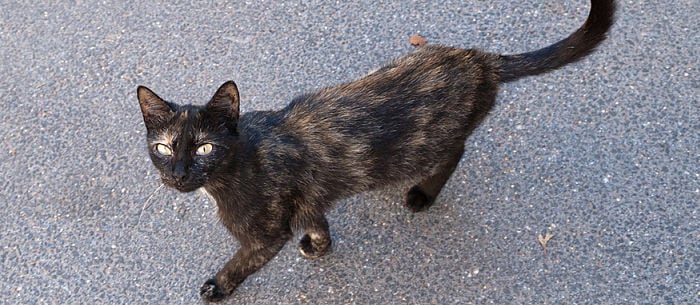It’s concerning when you notice your cat losing weight. You’ve been putting her food out every day and giving her plenty of water, so what could be going on? There are actually many possible reasons that Fluffy is losing weight. Here’s what might be causing your cat’s weight loss and what to do when you discover it.
What’s Causing My Cat’s Weight Loss?
Dr. Michael Herman of Pet Medical Center says there are many possible causes of cat weight loss.
Here are some reasons that could potentially be behind your kitty’s weight loss:
- Dirty Environment
Are you cleaning your cat’s food and water bowl daily? Cats don’t like eating off dirty plates. They also don’t like eating near their litter box. Think about it — you wouldn’t like eating in the bathroom or off dishes covered with food residue, so why would they? This is an easy fix.
- Stress
Is there a lot of chaos in your home? A barking dog, noisy children or construction going on? Stress causes cats to eat less because most cats need a calm, quiet, safe environment to eat.
- Change
Cats hate change. A move, owners going on vacation and being replaced with a cat sitter, someone returning to work or school after being home for a while, a new baby or even rearranging the furniture can cause cats to shy away from food, leading to weight loss.
- Toothache
Your cat may have stopped eating due to a dental problem.
- Parasites
Your cat may have contracted a parasite, such as roundworms. This is easily diagnosed and treated with a vet visit.
- Type of Food
Your cat may have an issue with the type of food you’re feeding him. It could be upsetting his stomach — or he just might not like it.
- Age
Many cats lose weight as they get older. This is often natural and not necessarily a sign of a bigger health problem.
- Illness
A cat losing weight can be a symptom of an illness. It could range from something small and easily treatable, like a urinary tract infection, to major disease, including cancer.
What Can I Do If My Cat Is Losing Weight?
If you have any concerns about your cat’s weight, contact your veterinarian, Dr. Herman says. “While waiting for the appointment, pay attention to how much your cat is eating and drinking, as well as how often they use the litter box,” he advises.
How Will the Vet Make a Diagnosis?
Dr. Herman says the visit will likely start with your cat on the scale. Her current weight will be checked against her past measurements noted in her records. Dr. Herman explains that your vet will have several questions for you, so you should come prepared with knowledge of the following:
-
When did you first notice the weight loss?
-
Is he eating normally? If not, when did that change?
-
Is he drinking more or less than normal?
-
How often is she using the litter box?
-
Has there been any change to her routine?
-
Has his personality changed?
-
Have you noticed any drooling?
-
Is he having litter box accidents?
Most vets will also run tests, Dr. Herman explains. The vet will use the answers to your questions, the test results and the observations from the examination to determine why your cat is losing weight.
Sometimes cat weight loss is natural and healthy. For example, Dr. Herman says, “Most outdoor cats naturally lose weight in the spring and summer when the weather allows them to explore. Their weight loss is usually because of an increase in activity.” But if your cat’s weight loss is unexplained and you have concerns about your pet, it’s always best to call your vet.
And check out The 5 Most Common Cat Diseases.
Rachael Moshman is a freelance writer and owner of four cats.
* This article is for general informational purposes only. It is not intended nor implied to be providing medical advice and is not a substitute for such advice. The reader should always consult a health care provider concerning any medical condition or treatment plan. Neither Care.com nor the author assumes any responsibility or liability with respect to use of any information contained herein.






